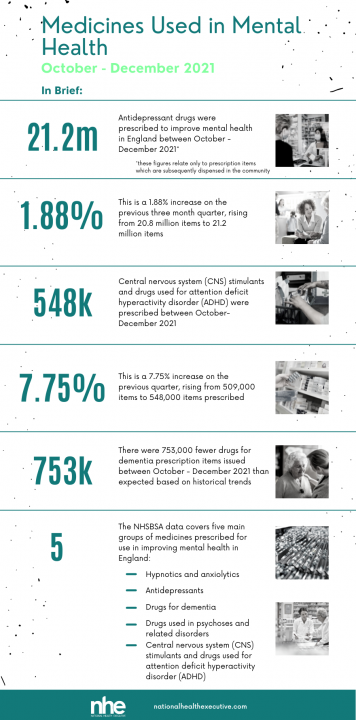Twenty one million antidepressant drugs were prescribed by the NHS between October and December 2021, an increase of more than 1.8% on the previous quarter, according to the latest data released by NHS Business Services Authority (NHSBSA).
The newly-released figures also showed that 1.71 million more antidepressant prescription items were issued in the 22-month period since the implementation of lockdown measures (March 2020 – December 2021) than was expected based on historical trends.
Although there was an overall rise in prescriptions, it was seen to be a steady and natural increase – described as not being a ‘statistically significant’ increase by NHSBSA.
A ‘statistically significant’ increase means that a change could have occurred randomly, but it is unlikely. Instead, it is much more likely that there is a cause.

Click to open the 'In Brief' infographic in full size
In total, over the October-December 2021 period, 21.2 million antidepressants were prescribed, compared with 20.8 million items over the previous three-month quarter (a 1.88% increase).
It also represented a 3.48% increased when compared with the same October-December quarter the previous year, with 20.5 million antidepressant drugs prescribed in 2020/21.
As part of this, central nervous system (CNS) stimulants and drugs used for attention deficit hyperactivity disorder (ADHD) showed an increase of 7.75% on the previous quarter, rising to 548,000 items prescribed compared to 509,000 in the three months prior.
This was also a 12.6% increase on the 487,000 items prescribed for the same quarter the previous year.
One area which did see a ‘statistically significant’ change was in dementia prescription items, where 753,000 fewer drugs were issued than expected based on historical trends.
The NHSBSA data covers five main groups of medicines used to improve mental health in England:
- Hypnotics and anxiolytics (used to treat insomnia and anxiety)
- Antidepressants
- Drugs for dementia
- Drugs used in psychoses and related disorders
- Central nervous system (CNS) stimulants and drugs used for attention deficit hyperactivity disorder (ADHD)
The data collated is based on the prescribing of medicines in England which are subsequently dispensed in the community. It does not include data on medicines used in secondary care, prisons, or issued by a private prescriber.
Mental health is a key area highlighted in the NHS Long Term Plan, with the regular publication of data on the prescription of medicines used to improve mental health in England aimed at providing greater visibility of trends.
The latest quarterly data release can be accessed from NHSBSA.



















